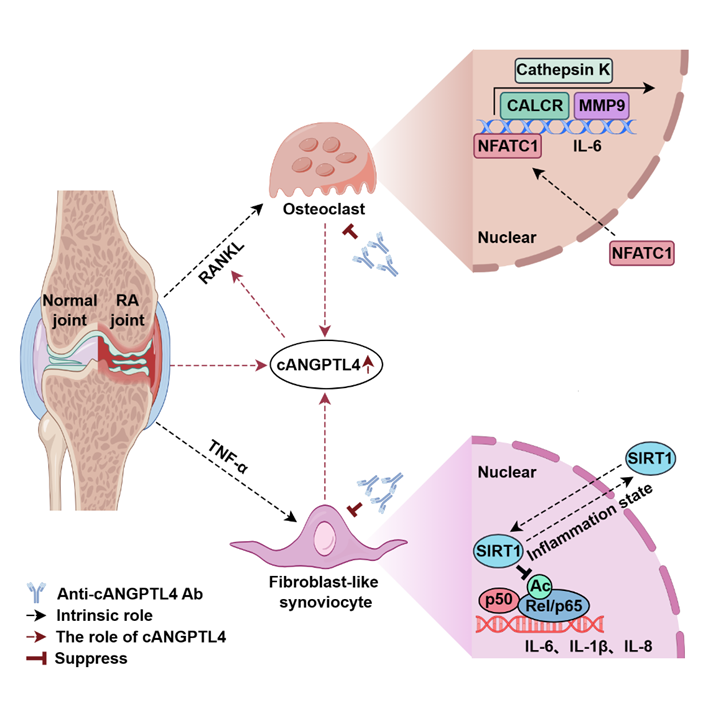Researchers Reveal Novel Therapeutic Approach for Rheumatoid Arthritis
Date:23-10-2024 | 【Print】 【close】
Rheumatoid arthritis (RA) is the most common form of chronic inflammatory arthritis, characterized by synovitis and progressive destruction of bone and cartilage in the affected joints. Conventional synthetic disease-modifying antirheumatic drugs (csDMARDs) are typically prescribed immediately after an RA diagnosis to minimize joint damage. However, some patients' poor response to standard treatments highlights the urgent need for new therapies.
Recently, a research team led by Dr. CHENG Wenxiang from the Shenzhen Institutes of Advanced Technology of the Chinese Academy of Sciences, in collaboration with Prof. ZHANG Peng from the Shenzhen University of Advanced Technology and Prof. LI Liang from the Southern University of Science and Technology, has discovered that overexpression of Angiopoietin-like protein 4 (ANGPTL4) is a characteristic of RA patients. Neutralizing the C-terminal fragments of ANGPTL4 reduced the severity of arthritis in animal models.
The study was published in Molecular Therapy on Oct. 4.
In this study, researchers demonstrated elevated ANGPTL4 expression levels in the sera and synovial tissues of RA patients, as well as animal models of collagen-induced arthritis (CIA) and adjuvant-induced arthritis (AIA). Administering an anti-cANGPTL4 antibody to neutralize part of ANGPTL4 led to reduced severity and inhibited inflammatory processes in CIA and AIA animal models. Furthermore, treatment with anti-cANGPTL4 antibody has been shown to inhibit bone destruction in CIA and AIA animal models.
Mechanistic studies showed that the anti-cANGPTL4 antibody reduces inflammation in the fibroblast-like synoviocytes by modulating the SIRT1/NF-κB pathway. Furthermore, the anti-cANGPTL4 antibody has been shown to mitigate RANKL-induced osteoclastogenesis. Additionally, this study's findings suggest that the anti-cANGPTL4 antibody inhibits the invasion and migration of fibroblast-like synoviocytes, thereby suppressing osteoclast activation.
“Our work not only identifies a potential valuable biomarker for monitoring the progression of RA but also offers a promising approach for its effective treatment,” said by Dr. CHENG.

Mechanisms of action of anti-ANGPTL4 antibody (Ab) therapy in rheumatoid arthritis. (Image by SIAT)
Media Contact: LU Qun
Email: qun.lu@siat.ac.cn
Download the attachment: